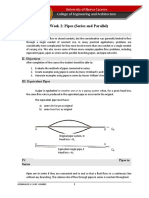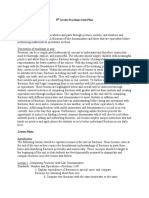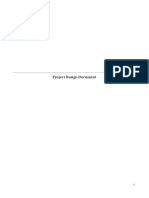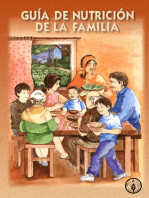0 ratings0% found this document useful (0 votes)
31 viewsThe Role of Indigenous Knowledge in Ensuring Food
The Role of Indigenous Knowledge in Ensuring Food
Uploaded by
Hillary RonohThis study examines the role of indigenous knowledge in ensuring food security in Nyamira County, Kenya since 1963. Indigenous knowledge refers to the local knowledge and practices of particular societies and cultures, and has traditionally guided decision-making around farming, diet, and more. The study aims to investigate traditional Abagusii methods for enhancing food security, identify shifts over time, determine how indigenous knowledge integrates with modern farming, and assess its effects on production and security. Interviews and field observations will be used to document indigenous strategies around storage, processing and preservation that contribute to food security. The findings could help preserve valuable indigenous practices and encourage integration with modern methods to better assure food supply in Kenya.
Copyright:
© All Rights Reserved
Available Formats
Download as DOCX, PDF, TXT or read online from Scribd
The Role of Indigenous Knowledge in Ensuring Food
The Role of Indigenous Knowledge in Ensuring Food
Uploaded by
Hillary Ronoh0 ratings0% found this document useful (0 votes)
31 views3 pagesThis study examines the role of indigenous knowledge in ensuring food security in Nyamira County, Kenya since 1963. Indigenous knowledge refers to the local knowledge and practices of particular societies and cultures, and has traditionally guided decision-making around farming, diet, and more. The study aims to investigate traditional Abagusii methods for enhancing food security, identify shifts over time, determine how indigenous knowledge integrates with modern farming, and assess its effects on production and security. Interviews and field observations will be used to document indigenous strategies around storage, processing and preservation that contribute to food security. The findings could help preserve valuable indigenous practices and encourage integration with modern methods to better assure food supply in Kenya.
Original Title
The role of indigenous knowledge in ensuring food
Copyright
© © All Rights Reserved
Available Formats
DOCX, PDF, TXT or read online from Scribd
Share this document
Did you find this document useful?
Is this content inappropriate?
This study examines the role of indigenous knowledge in ensuring food security in Nyamira County, Kenya since 1963. Indigenous knowledge refers to the local knowledge and practices of particular societies and cultures, and has traditionally guided decision-making around farming, diet, and more. The study aims to investigate traditional Abagusii methods for enhancing food security, identify shifts over time, determine how indigenous knowledge integrates with modern farming, and assess its effects on production and security. Interviews and field observations will be used to document indigenous strategies around storage, processing and preservation that contribute to food security. The findings could help preserve valuable indigenous practices and encourage integration with modern methods to better assure food supply in Kenya.
Copyright:
© All Rights Reserved
Available Formats
Download as DOCX, PDF, TXT or read online from Scribd
Download as docx, pdf, or txt
0 ratings0% found this document useful (0 votes)
31 views3 pagesThe Role of Indigenous Knowledge in Ensuring Food
The Role of Indigenous Knowledge in Ensuring Food
Uploaded by
Hillary RonohThis study examines the role of indigenous knowledge in ensuring food security in Nyamira County, Kenya since 1963. Indigenous knowledge refers to the local knowledge and practices of particular societies and cultures, and has traditionally guided decision-making around farming, diet, and more. The study aims to investigate traditional Abagusii methods for enhancing food security, identify shifts over time, determine how indigenous knowledge integrates with modern farming, and assess its effects on production and security. Interviews and field observations will be used to document indigenous strategies around storage, processing and preservation that contribute to food security. The findings could help preserve valuable indigenous practices and encourage integration with modern methods to better assure food supply in Kenya.
Copyright:
© All Rights Reserved
Available Formats
Download as DOCX, PDF, TXT or read online from Scribd
Download as docx, pdf, or txt
You are on page 1of 3
THE ROLE OF INDIGENOUS KNOWLEDGE IN ENSURING FOOD
SECURITY IN NYAMIRA COUNTY KENYA SINCE 1963 TO PRESENT
Introduction
This study will examine and document the of indigenous knowledge in enhancing
food security in Kenya focusing on Nyamira county. In this context,indigenous
knowledge is the local knowledge that is distinctive to a particular society and
culture . It is the foundation for community decision making in farming, well-being,
diet preparation, school and a host of other undertakings.
On the other hand food security refers to when all people at all times have access to
sufficient, safe, nutritious food to maintain a healthy and active life ( World food
summit 1996). Indigenous people have developed indigenous practices and
technology for storage, processing and preservation.
Objectives
This research will shade more light on the following
To investigate the traditional methods which were utilized by Abagusii to
enhance food security
To determine paradigm shifts in enhancing food security
To find out the mechanisms that can be adopted to enhance food security
To assess the extent to which indigenous knowledge is integrated in the current
farming methods for food security
Study questions
1. What are the specific indigenous knowledge strategies used by the Abagusii of
Nyamira county in enhancing food security?
2. How is indigenous knowledge integrated in the current farming methods for food
security?
3. What are the effects of the integration on crop production and food security
4. Which are the modern mechanisms employed to enhance food security in our
country?
Statement of the problem
It can be argued that the abandonment of the indigenous knowledge systems is one of
the causes of food insecurity as witnessed nowadays .Historically indigenous
knowledge was perceived as being mysterious, outdated, unfashionable and irrelevant
particularly to the development of developing countries.
Consequently this perception led to the marginalization of indigenous knowledge
which is now facing the danger of extinction because modernisation and other global
changes have weaken its value and disrupted its transmission and preservation.Thus
African rural communities have been living in high levels of poverty as a result of
food insecurity. This study therefore endeavours to explore the role of indigenous
knowledge in ensuring food security in Nyamira county, Kenya
Justification
Old people who hold indigenous knowledge are dying and taking with them
valuable information to the grave meaning this information if not documented
will get lost forever yet indigenous is necessary to help country assured of enough
food production . This study is intended to establish and recommend that
indigenous knowledge should be documented and preserved before it gets extinct
if its role is found to be significant
There is little literature on the use of indigenous knowledge in ensuring food
security in the country.
This study will therefore go along way in adding knowledge to any subsequent
study on food security and any developmental intervention that is likely to impact
on the rural communities. Thus it will easily fill the sap of available local
information and data on use of indigenous knowledge
The recognition of the importance and value of indigenous knowledge and
practices is almost lacking in the Kenyan context . This research will explore and
document the usefulness of indigenous knowledge as far as food security is
concerned so that it is taken to be one of the interventions to be put in place so
that there is enough and regular food supply in the country
At the same time since agriculture is given prominence as a driving force
through which poverty can be alleviated and food security assured ,this study will
hopefully encourage the people of Nyamira and others to appreciate their own
traditional methods in enhancing food production in combination with modern
farming methods . It will raise their self esteem as it will specifically identify
indigenous practices which enhance food security
The study will also provide ministry of agriculture with information that will
stimulate it to acknowledge the role of indigenous knowledge in ensuring food
security hence make an effort to preserve it for future generations
Location
The research will geographically confine itself to Rigoma location in Borabu North
sub county in Nyamira county
This area is preferred as it has a reservoir of resource persons particularly the old
people with knowledge on utilisation of indigenous knowledge to ensure food
security among Abagusii people
This is also an area where there are still some pockets of indigenous knowledge
practices related to food security for example storage of food using traditionally
constructed stores (granaries)
Methodology
To obtain primary data individual and group interviews will be conducted
Random sampling will be employed to get the resource persons involved in food
production using indigenous knowledge in Rigoma division by use of pieces of papers
bearing “Yes or No “
Structured questionnaire will also put into use comprising of open and closed ended
questions
Field observation will also be undertaken to observe the various mechanisms used to
produce , preserve or store food
Data collection instruments will include questionnaires which are easy to administer
and even arrange and organize data easily
The collected data will be analyzed qualitatively
The study will also be guided by Robert Chamber’s Theory of sustainable livelihood
You might also like
- Penstock Thickness CalculationDocument2 pagesPenstock Thickness Calculationrakesh1987_careers100% (8)
- Sustaining Global Food Security: The Nexus of Science and PolicyFrom EverandSustaining Global Food Security: The Nexus of Science and PolicyRobert S. ZeiglerRating: 2 out of 5 stars2/5 (1)
- Why Do People Communicate?Document4 pagesWhy Do People Communicate?Charles Benedict Capayan100% (1)
- Week 2 Template PDFDocument12 pagesWeek 2 Template PDFAngelica LosaresNo ratings yet
- 3rd Grade Fractions Unit PlanDocument10 pages3rd Grade Fractions Unit PlanSarah Sell100% (2)
- Department of EducationDocument4 pagesDepartment of EducationLYr EHsNo ratings yet
- Concept PaperDocument3 pagesConcept PaperHillary RonohNo ratings yet
- Food Science Nutrition - 2019 - Kuyu - Review On Contribution of Indigenous Food Preparation and Preservation TechniquesDocument13 pagesFood Science Nutrition - 2019 - Kuyu - Review On Contribution of Indigenous Food Preparation and Preservation TechniquesnahamayaramanahatarataNo ratings yet
- Food Security in AfricaDocument13 pagesFood Security in AfricambelelungeloNo ratings yet
- Assessment of Food Safety Practices Among Cassava Processors in Selected Rural Communities of Oyo State, Nigeria Thomas KA and ON PhilipsDocument18 pagesAssessment of Food Safety Practices Among Cassava Processors in Selected Rural Communities of Oyo State, Nigeria Thomas KA and ON PhilipsHarun UmmulkhairNo ratings yet
- MarinkaDocument24 pagesMarinkameNo ratings yet
- Awareness Attitude and Utilization of Orange-FleshDocument12 pagesAwareness Attitude and Utilization of Orange-FlesheatmeryanNo ratings yet
- Zainab ProposalDocument11 pagesZainab ProposalOko IsaacNo ratings yet
- Project Design DocumentDocument14 pagesProject Design Documentenock4warindaNo ratings yet
- Ijarotimi Ogunsemore 2006 Weaning Foods and Their Impact On Child Feeding Practices Among Low Income Nigerian MothersDocument8 pagesIjarotimi Ogunsemore 2006 Weaning Foods and Their Impact On Child Feeding Practices Among Low Income Nigerian MothersAbdul JamesNo ratings yet
- Eco-Friendly Indigenous Farming Practices Among Sorsoguenos in Sorsogon, PhilippinesDocument16 pagesEco-Friendly Indigenous Farming Practices Among Sorsoguenos in Sorsogon, PhilippinesHdjabsbNo ratings yet
- Indigenous FoodDocument14 pagesIndigenous Foodfairen xielNo ratings yet
- Sustainability 13 03449Document19 pagesSustainability 13 03449DakshKapoorNo ratings yet
- Coping Strategies Adopted by Iraya MangyDocument8 pagesCoping Strategies Adopted by Iraya MangyRiu CarbonillaNo ratings yet
- The Role of Indigenous KnowledDocument18 pagesThe Role of Indigenous KnowledKaterina BlackNo ratings yet
- Preservation of Cavite's Cultural FoodsDocument7 pagesPreservation of Cavite's Cultural FoodsPrince Wilson AguinaldoNo ratings yet
- Literature Review On Food Security in KenyaDocument7 pagesLiterature Review On Food Security in Kenyac5q8g5tz100% (1)
- Journal Homepage: - : IntroductionDocument9 pagesJournal Homepage: - : IntroductionIJAR JOURNALNo ratings yet
- Food Fair 2022 ArticleDocument24 pagesFood Fair 2022 ArticleJames KiokoNo ratings yet
- Food Beliefs and Practices Among The Kalenjin Pregnant Women in Rural Uasin Gishu County, KenyaDocument16 pagesFood Beliefs and Practices Among The Kalenjin Pregnant Women in Rural Uasin Gishu County, KenyapbiegonitcNo ratings yet
- Maternal Knowledge, Attitude, and Practices About Traditional Food Feeding With Stunting and Wasting of Toddlers in Farmer FamiliesDocument10 pagesMaternal Knowledge, Attitude, and Practices About Traditional Food Feeding With Stunting and Wasting of Toddlers in Farmer Familiesnewbire vlogNo ratings yet
- Food Security Thesis ProposalDocument6 pagesFood Security Thesis Proposalleslylockwoodpasadena67% (3)
- Nutrition Sensitive Agriculture in Tripura, An OverviewDocument7 pagesNutrition Sensitive Agriculture in Tripura, An OverviewShaibal BiswasNo ratings yet
- Food Preparation Practices and Nutrition Knowledge of Household Caregivers in Southern Kwazulu NatalDocument20 pagesFood Preparation Practices and Nutrition Knowledge of Household Caregivers in Southern Kwazulu NatalRitu B MalhotraNo ratings yet
- ApplicationsDocument7 pagesApplicationsJulibeth Joy MalangNo ratings yet
- Concept Note - ADFNS - Nut Symposium 2017 - DraftDocument8 pagesConcept Note - ADFNS - Nut Symposium 2017 - DraftAbigail AnziaNo ratings yet
- The Role of Food ProcessingDocument20 pagesThe Role of Food ProcessingANKURNo ratings yet
- GROUP 8 PHN - Case Study On Importance of A Public Health NutritionistDocument9 pagesGROUP 8 PHN - Case Study On Importance of A Public Health NutritionistAndrea JiongcoNo ratings yet
- Chapter - One-Three MOHAMMEDDocument51 pagesChapter - One-Three MOHAMMEDAbubakar Ibrahim banaNo ratings yet
- Factors Influencing The Attitude of Women Towards Family Planning in Alimosho Local Government Authority, Lagos State.Document65 pagesFactors Influencing The Attitude of Women Towards Family Planning in Alimosho Local Government Authority, Lagos State.DanielNo ratings yet
- 1, Lillian Final Reseach PaperDocument20 pages1, Lillian Final Reseach PaperEmmanuel E. MawangaNo ratings yet
- Food Security Related ThesisDocument4 pagesFood Security Related Thesismichelethomasreno100% (2)
- Infant and Young Child Feeding Practices, Dietary Diversity and Their Association With Nutritional Status of Nomadic Children Under 5 Years of AgeDocument8 pagesInfant and Young Child Feeding Practices, Dietary Diversity and Their Association With Nutritional Status of Nomadic Children Under 5 Years of AgeInternational Journal of Innovative Science and Research TechnologyNo ratings yet
- Food Taboos and Myths in South Eastern Nigeria: The Belief and Practice of Mothers in The RegionDocument6 pagesFood Taboos and Myths in South Eastern Nigeria: The Belief and Practice of Mothers in The RegionBrilianita TrisnaNo ratings yet
- 3.5.1.2 Final Report of Ifugao IfugaoDocument148 pages3.5.1.2 Final Report of Ifugao Ifugaoreymondrosales257No ratings yet
- Validation of The Household Food Insecurity Access Scale in Rural Tanzania PDFDocument8 pagesValidation of The Household Food Insecurity Access Scale in Rural Tanzania PDFDM YazdaniNo ratings yet
- 10.5.5.2 Final Report of Subanen Zamboanga Del SurDocument55 pages10.5.5.2 Final Report of Subanen Zamboanga Del Surlklklklk8908100% (3)
- Chapter IIDocument7 pagesChapter IILeslie MagallanesNo ratings yet
- FNS 2015081114551240Document10 pagesFNS 2015081114551240salimendris3No ratings yet
- Sustainability 11 02715Document18 pagesSustainability 11 02715Culinary Institute of Ethiopia CIENo ratings yet
- Supplementary Food KENYADocument11 pagesSupplementary Food KENYAEliAngelesNo ratings yet
- FOODCOMPOSITIONTABLE BURKINAFASO Final1Document51 pagesFOODCOMPOSITIONTABLE BURKINAFASO Final1SATCHIVI ChelseaNo ratings yet
- Pranshu PPDocument6 pagesPranshu PPkieranjpereira75No ratings yet
- Including Indegenous Knowledge of Local Foods, in our Primary School Curriculum as a Support Food System and a Coping Strategy in Adverse Nutrition Emergencies. Lessons from the Amazon Plane Crash Survivors. (The Amazon Miracle Children)Document5 pagesIncluding Indegenous Knowledge of Local Foods, in our Primary School Curriculum as a Support Food System and a Coping Strategy in Adverse Nutrition Emergencies. Lessons from the Amazon Plane Crash Survivors. (The Amazon Miracle Children)International Journal of Innovative Science and Research TechnologyNo ratings yet
- Garuda 562752Document16 pagesGaruda 562752Endang Rahmah WatiNo ratings yet
- Barefoot Guide Surviving Covid 19 The Neglected Remedy - Low - Resolution - 2Document40 pagesBarefoot Guide Surviving Covid 19 The Neglected Remedy - Low - Resolution - 2SADDI87No ratings yet
- Frongillo Et Al.Document11 pagesFrongillo Et Al.Franchesqa Myluck SamonteNo ratings yet
- Thesis On Food Security in KenyaDocument6 pagesThesis On Food Security in Kenyapak0t0dynyj3100% (2)
- Determinants of Food Insecurity and TheDocument15 pagesDeterminants of Food Insecurity and TheFirafir FirafirNo ratings yet
- Determinants of Food Security Among The Rural FarmDocument9 pagesDeterminants of Food Security Among The Rural Farmd4h2q7f5hpNo ratings yet
- Essay Topic: Promoting Food Security in The Caribbean RegionDocument2 pagesEssay Topic: Promoting Food Security in The Caribbean RegionDeadly ChillerNo ratings yet
- 7 Local and Global InitiativesDocument10 pages7 Local and Global Initiativesdyz2nybk8zNo ratings yet
- The First 1,000 Days Window of OpportunityDocument6 pagesThe First 1,000 Days Window of OpportunityCar OrdzNo ratings yet
- Family Nutrition GuideFrom EverandFamily Nutrition GuideNo ratings yet
- Eat Local, Taste Global: How Ethnocultural Food Reaches Our TablesFrom EverandEat Local, Taste Global: How Ethnocultural Food Reaches Our TablesNo ratings yet
- Marginalizing Access to the Sustainable Food System: An Examination of Oakland's Minority DistrictsFrom EverandMarginalizing Access to the Sustainable Food System: An Examination of Oakland's Minority DistrictsNo ratings yet
- Sustainable Diets: Linking Nutrition and Food SystemsFrom EverandSustainable Diets: Linking Nutrition and Food SystemsBarbara BurlingameNo ratings yet
- Essentials of Food Safety in the Hospitality IndustryFrom EverandEssentials of Food Safety in the Hospitality IndustryNo ratings yet
- Guía de nutrición de la familiaFrom EverandGuía de nutrición de la familiaRating: 4 out of 5 stars4/5 (1)
- Of Participation: Hillary Kiplagat RonohDocument1 pageOf Participation: Hillary Kiplagat RonohHillary RonohNo ratings yet
- MUS 1 20220730154725265regularDocument3 pagesMUS 1 20220730154725265regularHillary RonohNo ratings yet
- Ipsas Template Empty 22Document66 pagesIpsas Template Empty 22Hillary RonohNo ratings yet
- Math F4 PP1 MSDocument12 pagesMath F4 PP1 MSHillary RonohNo ratings yet
- Ministry of EducationDocument2 pagesMinistry of EducationHillary RonohNo ratings yet
- NemisDocument9 pagesNemisHillary RonohNo ratings yet
- 2021 Kcse Results Analysis - Templates and Cov. LetterDocument5 pages2021 Kcse Results Analysis - Templates and Cov. LetterHillary RonohNo ratings yet
- 02-07-02 (Lalala1)Document9 pages02-07-02 (Lalala1)Precious BalgunaNo ratings yet
- William Henry Perkin: The Man Who Invented Synthetic DyesDocument2 pagesWilliam Henry Perkin: The Man Who Invented Synthetic DyesmghNo ratings yet
- Seminar ReportDocument23 pagesSeminar ReportlabeebaNo ratings yet
- Science, Technology, Society Reviewer - Introduction To STSDocument2 pagesScience, Technology, Society Reviewer - Introduction To STSjenriaaacessNo ratings yet
- Mass Communication Theories: ICOM 110: March-JuneDocument20 pagesMass Communication Theories: ICOM 110: March-JuneBackford NandoloNo ratings yet
- Algorithm - Docx Form 4-53AEBDocument3 pagesAlgorithm - Docx Form 4-53AEBwater bottleNo ratings yet
- C10 Kelloway MOHS8e FinalDocument42 pagesC10 Kelloway MOHS8e FinalSabin KarakhetiNo ratings yet
- Heavy Metals Removal - WastewaterDocument43 pagesHeavy Metals Removal - WastewaterSong Nguyen NguyenNo ratings yet
- High Temperature Oxidation and Quenching Og Chromium CoatedDocument15 pagesHigh Temperature Oxidation and Quenching Og Chromium CoatedBernarda QuirogaNo ratings yet
- Nmos and Pmos Plot Using VlsiDocument13 pagesNmos and Pmos Plot Using VlsiSaathvik R KhatavkarNo ratings yet
- "What Have I Ever Done To You" by Phoebe June Mcdonald ConlonDocument3 pages"What Have I Ever Done To You" by Phoebe June Mcdonald ConlonRosenda N. GulaneNo ratings yet
- Test 25Document14 pagesTest 25Hà LinhNo ratings yet
- University of Tripoli Chemical Engineering Department Unit Operations Lab Ii " Che 432 "Document13 pagesUniversity of Tripoli Chemical Engineering Department Unit Operations Lab Ii " Che 432 "Mohamed ElbehlilNo ratings yet
- Short ParagraphDocument2 pagesShort ParagraphSuvro Avro75% (8)
- Statistics and Probability: Sampling and Sampling DistributionsDocument10 pagesStatistics and Probability: Sampling and Sampling DistributionsJoyce Ann ChavezNo ratings yet
- Broke N Symm Etry: by Ian Stewart Natures NumberDocument14 pagesBroke N Symm Etry: by Ian Stewart Natures NumberRoger ManuelNo ratings yet
- Weekly-Learning-Plan 2Document5 pagesWeekly-Learning-Plan 2RONALYN BERNADASNo ratings yet
- WWW - Coforgetech.c Om: Coforge LimitedDocument5 pagesWWW - Coforgetech.c Om: Coforge LimitedNeha BhatiNo ratings yet
- Unit 2 Features of Contract EnglishDocument43 pagesUnit 2 Features of Contract EnglishKim DuyênNo ratings yet
- Đề Chính ThứcDocument12 pagesĐề Chính Thứctragiang.duong1902No ratings yet
- IGCSE Biology Section 3 Lesson 3Document72 pagesIGCSE Biology Section 3 Lesson 3Azween SabtuNo ratings yet
- GRADES 1 To 12 Daily Lesson Log Monday Tuesday Wednesday Thursday FridayDocument4 pagesGRADES 1 To 12 Daily Lesson Log Monday Tuesday Wednesday Thursday FridayNica Joy AlcantaraNo ratings yet
- Siwes ReportDocument13 pagesSiwes ReportAbdulsamadNo ratings yet
- 1 Pricelist PPR Pipes Url1649776675Document32 pages1 Pricelist PPR Pipes Url1649776675Karim ZazaNo ratings yet
- WEEK25 (18-24 Jun)Document14 pagesWEEK25 (18-24 Jun)Rorna LidamNo ratings yet
































































































